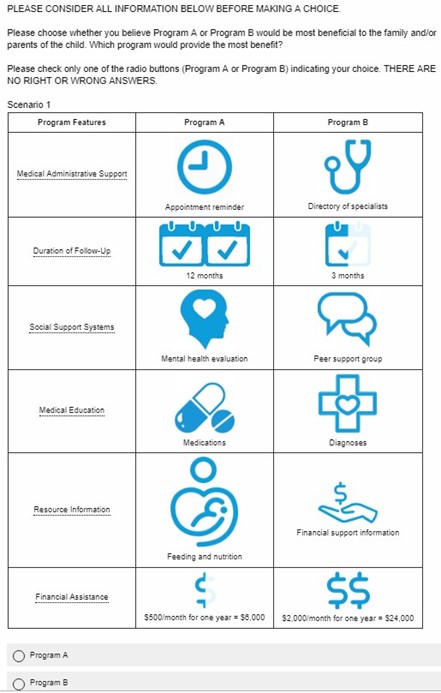Health Services Research
HSR 4: National or Novel
605 - IMPROVING TRANSITION HOME FROM THE NEONATAL INTENSIVE CARE UNIT USING A DISCRETE CHOICE EXPERIMENT: parental perspective
Publication Number: 605.32

Cynthia Gong, PharmD, PhD
Assistant Professor
CHLA/USC
Los Angeles, California, United States
Presenting Author(s)
Background:
Discharge from a neonatal intensive care unit (NICU) requires significant medical and social support. Discrete choice experiments (DCE) estimate an individual’s preferences when faced with a choice scenario based on economic theory.
Objective: We used a DCE to identify key features of a NICU transition-of-care (TOC) program among parents.
Design/Methods:
We designed a DCE containing the following 6 attributes of various levels: follow-up duration (3-24 months), financial support ($500-4000/month), medical communication (appointment reminders, printed care plan, or directory of specialists), resource information (nutrition, housing, transportation, and financial aid), social support (peer, nursing, social work, or mental health), and medical information (durable medical equipment (DME), diagnoses, medications, or early intervention services). Parents chose a preferred TOC program from 2 alternatives composed of varying levels of each attribute (Figure 1). Responses were analyzed via mixed logit models, and odds-ratios and willingness-to-pay for each attribute was estimated. Results were compared to previously-collected clinician responses from the American Academy of Pediatrics neonatology list-serv to the same survey.
Results: 47 patient families completed the survey. Parents valued nursing vs. peer support (OR=1.81, p=0.05) at $9,449, and especially early intervention services information vs. DME equipment information (OR=2.37, p=0.006) at $13,791. No other features were statistically significant, including duration of follow-up; each additional month was worth $71 (p=0.92). In contrast, neonatal providers (n=234) valued financial aid (p=0.02) and social work services (p=0.02), but not additional nursing support (p=0.12). For providers, information on early intervention services was worth $7,992 (OR=2.08 vs. information on DME, p< 0.005), and each month of follow-up was worth $113 (p=0.65).
Conclusion(s): Families and clinicians highly value information on early intervention services. For parents, nursing support is more valuable than other types of support (e.g. social work, peer support). Results suggest that post-discharge services should focus on improving access to early intervention services, followed by developing additional support systems.
